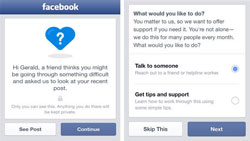Last month Facebook released suicide prevention resources that will provide users with more options when they see a friend post something that is concerning.
The updated tool lets users flag content on both their desktop and mobile versions of Facebook that they find worrisome. If a Facebook friend posts something that implies that they might be thinking of harming themselves, users can flag the post to report it. Facebook will then offer the concerned user the option to contact the friend, contact another friend for support, or contact a suicide helpline.
Facebook has given users a way to report potential suicidal content in the past. Since 2011, users could take screenshots of a troubling post and go to an official page for suicide prevention to help out their friends. However the recent updates are a more timely and simpler alternative to a “clunkier system,” said the Times.
“This tool has the potential to have a positive effect — perhaps even a lifesaving one — for those who make use of it. For a person who is feeling alone and suicidal, knowing that a friend noticed their distress and tried to help in this way provides evidence that his or her pain is not invisible. Also, being presented with positive options of responding and reaching out for help can make it easier for the suicidal person (who may be feeling too drained to seek out that information themselves) to take that path,” said Jamie Goodwin, an instructor of psychology.
According to a study published in the American Journal of Public Health, social media sites have increased both the rate of suicide and efforts to prevent suicide. The American Academy of Clinical Psychiatrists released a report stating that each year, approximately 2 million U.S. adolescents attempt suicide, and almost 700,000 receive medical attention for their attempt. Since the creation of the web cyberbullying has created a higher level of suicidal young adults.
“I think my posts would have been flagged when I was in high school. There was a time when I was struggling as a new mom, a single mom, and a confused mom. I used Facebook as a way to express my feelings. Kids made fun of me, and I felt like people didn’t know what I was going through” said Domonique Wilson, a sophomore social work major.
“I got through that time in my life because I had a good support system. This tool will provide that for many people. I think that sometimes people don’t want to intervene in someone’s life if they don’t really know them. But this gives you no excuse, you don’t have to speak face to face, all you have to do is hit a button and help will be sent to that person,” continued Wilson.
The University keeps statistics on students who take part in counseling. “What I can tell you is that not only at Monmouth University but nationwide, suicidal behavior and ideation occurs on a continuum,” said Franca Mancini, Director of Counseling Services.
“Students reporting significant depression and severe anxiety are numerous, anxiety running slightly higher. Students report and have depressive symptoms more than 50 percent of the time, and students with diagnosable anxiety in different degrees are more than 60 percent of the counseling population,” continued Mancini.
Facebook may consider these updates a positive step forward, however there might be some negative fallouts. The easier task of simply flagging a post instead of a more thoughtful intervention may cause Facebook users to fall prey to the “bystander effect”.
According to Goodwin, “The bystander effect is a psychological phenomenon in which the more people we presume are available to help someone, the less likely we are to take responsibility and do the helping ourselves. If a Facebook acquaintance posts something concerning, it may alarm us, but we are quite likely to think, ‘It’s not really my business’ or, ‘I don’t really know this person very well, I’m sure if there’s a problem a closer friend will help them.’ When everyone thinks this way, it is likely that no one will help, and that is when tragedies happen.”
Social media has become a staple in our society. Current generations will never know what life was like without it. “For better or for worse, it has become a primary platform on which people connect, reach out, and give and receive support. When something is as ubiquitous as social media has become, it is good news that those designing the sites are trying to find ways to be socially responsible and help their users beyond merely entertaining them and facilitating their interaction,” said Goodwin.
IMAGE TAKEN from cbsnews1.com



